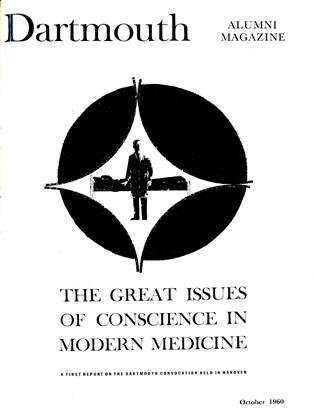Bollenbach Disputed
To THE EDITOR
Whenever the subject of racial or religious discrimination comes up, some writer, in this case Willard Bollenbach Jr. in your July issue, rushes forward to announce that "life is selective and discriminatory from the time one is born," and that "few of us would have it otherwise." Unfortunately, this argument seems to be based on a misconcep- tion as to just what constitutes discrimination, in the best sense of that word.
According to my dictionary, "one maymake a distinction by noting obvious, outward signs; discrimination requires comparison and weighs motives, character, qualities." A small child will frequently announce that he hates green vegetables and so refuse to taste them. According to Mr. Bollenbach, this would be a form of that admirable quality we call discrimination. Most parents, on the other hand, would conclude that the child was developing a rather idiotic prejudice through improperly applying a valid distinction. A vegetable should be judged by flavor and nutritional properties rather than by appearance. Thus, the wise parent would insist that the child at least taste the food in question. He may still dislike it, but he would then be applying the proper standards to the problem and, through such sensible trial and error, he would eventually develop a greater appreciation of a wider variety of foods.
Similarly, when selecting a wife or a friend or a piece of French pastry, one may announce that only those applicants of a specific shape, size, and color need apply. When an individual so limits his choice in advance, he simply runs the risk of missing a potential selection that might have proven to be far more intriguing than the one he did pick from the arbitrarily limited little crew he did consider. But for a group of individuals to band together and impose such limitations on one another makes even less sense, for certainly one of the group might have had the intelligence to stray, socially, farther afield had his associates not so discouraged such broadening of the horizons.
In an educational community, such an imposition of irrational and socially limiting regulations becomes a total absurdity. It seems to escape many people, but one of the main purposes of education is to expose the student to as wide a variety of experiences and ideas as is possible. A prime virtue of Dartmouth College lies in the selection system whereby students are gathered from all of the States and some foreign countries, rather than simply raked in from the immediately surrounding countryside. Were a Mormon from Salt Lake City to come to Hanover and then settle down to life in a club established just for Mormons from Salt Lake City, he would be depriving himself of a very concrete part of the educational process.
The College might tolerate such an arrangement. But one might validly ask why the organization went to so much trouble to obtain a thoroughly mixed student body only to permit those selectees to offset the gain by reestablishing the same tightly knit little circles from whence they came.
And to make bad matters worse, while our imaginary Mormons-from-Salt-Lake-City-Only Club might be a handicap to the education of its inmates, a fraternity which specifically barred Mormons-from-Salt-Lake-City would be insulting as well.
Weston, Conn.
"Lack of Logic"
To THE EDITOR
Mr. Bollenbach's letter in your July issue is further proof to me of the inaccuracy and lack of logic in discrimination by category. Just because of his opinions I have no intention of avoiding all '49ers, or of seeking the views of only non-college men.
One does wonder exactly what this lad studied; certainly not sociology, anthropology, or history. Perhaps it was zoology, as I understand that animals have the ability to discriminate only in terms of categories - a dog for a dog, a pig for a pig, or is it an eye for an eye?
THE DISCRIMINATING WIFE OF
Pasadena, Calif.
First Bolivian?
To THE EDITOR
Re last paragraph of picture caption, page 10, May issue: How about Joaquin Aguirre '44? You reviewed a book of his a few years ago.
New York, N. Y.
EDITOR'S NOTE: Mr. Aguirre did precede the two present sophomores Jorge Dandier and Willy Pacheco, from Bolivia. He came to Dartmouth as an exchange student and later joined the Class of 1944.
 View Full Issue
View Full Issue
More From This Issue
-
 Feature
FeatureMedicine's Moral Issues
October 1960 -
 Feature
FeatureA Rare Kind of Movie Star
October 1960 By RAYMOND J. BUCK '52 -
 Feature
FeatureDartmouth's Medical Opportunity
October 1960 By WARD DARLEY -
 Article
ArticleTHE FACULTY
October 1960 By HAROLD L. BOND '42 -
 Class Notes
Class Notes1911
October 1960 By NATHANIEL G. BURLEIGH, ERNEST H. GRISWOLD -
 Class Notes
Class Notes1933
October 1960 By WESLEY H. BEATTIE, GEORGE N. FARRAND
Letters to the Editor
-
 Letters to the Editor
Letters to the EditorLetters
January 1947 -
 Letters to the Editor
Letters to the EditorLetters to the Editor
JAN./FEB. 1978 -
 Letters to the Editor
Letters to the EditorLetters
SEPTEMBER 1982 -
 Letters to the Editor
Letters to the EditorLETTERS
NOVEMBER 1989 -
 Letters to the Editor
Letters to the EditorThe Power of Coaching
NOVEMBER 1996 -
 Letters to the Editor
Letters to the Editorreaders react
MAY | JUNE 2016

